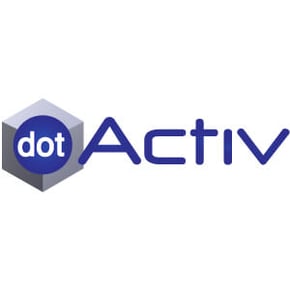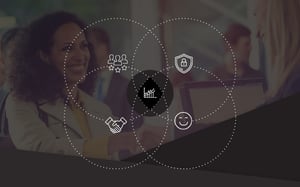Let us ask you this: What do you think your customers expect from you when they enter your store? If you were to say it’s to find the right product at the right price, you’d be correct. However, you shouldn't stop there. Your customers also crave a highly-personalised shopping experience. To provide that for them, there is a method known as clienteling.
What is clienteling?
At face value, ‘clienteling’ sounds like highfaluting at its finest - a fancy word that applies only to high-end retailers who cater to wealthy, demanding customers. In truth, it’s neither fancy nor exclusive.
Clienteling is a customer service technique that all retailers, regardless of their size or target market, would do well to employ. That’s because applying allows you the opportunity to establish long-term relationships with your shoppers. Simply put, it will enable your sales staff to deliver personalised customer experiences.
Of course, there are other customer service methods you can employ to build close relationships with your customers. You can place sales staff throughout your store with the sole purpose of answering queries and engaging with customers to find the right product. You could also put a staff member at your front door to hand out baskets, and greet your customers by name.
All of these strategies are worth doing, and we'd recommend you implement them - we even wrote about a few of them in this piece as well as in this piece. However, where clienteling differs, is you build relationships with your customers based on data collected about their preferences, behaviour and purchases.
That’s why Nitin Mangtani, founder and CEO of PredictSpring describes it as the future of in-store experiences in his piece for Forbes.com. And we’d agree. In understanding the data around your customers’ buying habits, you’re well placed to establish deep and meaningful relationships with them.
More than that, it can also help you to avoid having to face the problem that is brand switching - where you lose a once-loyal customer to a competitor. You can read up on why brand switching happens here.
Clienteling is important because it can lead to …
… Repeat business
If your customers enjoy shopping at your store, it goes without saying that they’ll visit again. Not only once or twice but, continuously.
That’s because you’ve given them a shopping experience that they can’t get at any of your competitors. Whenever a customer walks into your store, they know that you'll treat them as if they’re close, long-term friends. Better yet, before they even visit, if they need a specific product, and you stock it, you’re the first and only store they’ll think of.
Therein lies the power of building personal relationships with your customers.
Of course, the size of your store can play a part here. It’s far easier to connect one-on-one with your customers if you are a small, independent pharmacy than if you’re a larger FMCG retailer. But that shouldn’t stop you from attempting to deliver outstanding customer service. After all, we’re talking about customer data here. Every store, regardless of who they are, can strive to collect data in one shape or form to personalise their shopper experiences.
Let’s use the example of a loyalty card programme that you might find at your average retailer. For the sake of this example, it happens to be a reward card programme.
After joining, your customer receives $10 off their first purchase at any of your stores. Then, for every $1 spent, they’re awarded a point. At 100 points, they get a $10 gift voucher. Now, besides the points accumulation for them, every time they swipe their card, you can gather data about them. In collecting this information, you begin to understand them better and better.
That means you’ll know what they buy and when they buy it and so on. As a result, you’ll know what products to range and which to cut down on in future. More importantly, you’ll provide them with what they want so that they’ll become repeat customers.
… More customers
The advantage of building relationships with your customers is that you’re motivating them to return. After all, people want to shop at your store if you take an interest in them. That said, by taking a genuine interest in them - genuine being the keyword here - you’re also creating loyal customers.
What do loyal customers do? They sing your praises without you asking them to do it.
As soon as other shoppers hear about the personal relationship their friends or family have with your store, it’ll pique their interest. If they trust their friend or family member enough, they would also begin to wonder if they’ll receive the same level of service at your store if they shop there. There is only one way for them to find out. When they next need a product and your store offers it, they’ll consider visiting.
At this point, it’s worth looking at specific statistics around word-of-mouth marketing to strengthen our point.
According to an infographic compiled by Invesp, people are 90% more likely to trust and buy from a brand (or visit a store) if a friend recommends it. Meanwhile, 88% of consumers placed the highest level of trust in word-of-mouth recommendations from people they know.
Of course, many other factors can contribute towards a customer promoting your store via worth of mouth. Competitive pricing, regular promotions and a diverse range of products are just a few.
That said, you could argue that offering a highly-personalised service to your customers would count far more for them than if you had competitive pricing or a broad product assortment.
… an opportunity for you to upsell
As much as clienteling is about understanding data to offer your customers highly-personalised shopping experiences, it can’t only benefit shoppers. It also needs to make financial sense to you and your store. Fortunately, it does.
In collecting data on your customers’ preferences, behaviours and purchases, there is a clear opportunity for you to upsell them, thereby increasing your sales and profits.
Let’s use an example to illustrate our point.
Customer A buys at your store regularly. In fact, you could even describe them as loyal. Since they’ve purchased at your store multiple times before, you’ve collected enough data to know that they usually buy a particular spread of products whenever they visit. Using this information, you can now set about cross-merchandising complementary products nearby these products to encourage them to purchase more.
On the other hand, once a shopper has found a product that has satisfied their need, it’s up to your sales staff to find a product that will fulfil their want. A great sales associate should be able to convince your customers that while they’ve made a fantastic choice, they won’t be satisfied without adding another product.
The other tactic is to offer an alternative. For example, if a customer comes in looking for a product and can’t find it, instead of them leaving without anything, a sales associate can step in. Due to them knowing what the customer wanted, they can offer the next best product. Along with an additional product that could complement that item.
Just a note of warning here: while you can use your customer data to upsell shoppers, it’s not about forcing them to buy more than what they intended to. Instead, it’s about giving your customers options. It’s also about helping them find the best solution to their problem.
… better-informed sales staff who can offer a personalised service
The obvious benefit of employing a technique such as clienteling in your store is that it will improve the overall knowledge of your sales staff.
On this point, it’s not only about understanding what your customers need as it’s about knowing about the different products that can fulfil their demands. In that way, it’s closely related to our point about upselling - your staff should anticipate rather than react to your customers.
That said, it’s worth looking at the consequences of your staff not knowing or not using the customer data that is available to them.
For one, how are your staff expected to sell products or even promote them if they lack the necessary knowledge? In fact, how do you expect them to offer any form of service without the proper information?
Let’s say a loyal customer walks into your store and they put a few products in their basket. A well-informed staff member who has all the customer information at their fingertips (as well as product knowledge) might see their basket and know precisely what to do to get them to increase the size of it.
On the other hand, if you haven’t shared the data with your employees, you’ll lose a perfect opportunity to help your customers. On top of that, you’ll miss a moment to increase your sales and profits.



